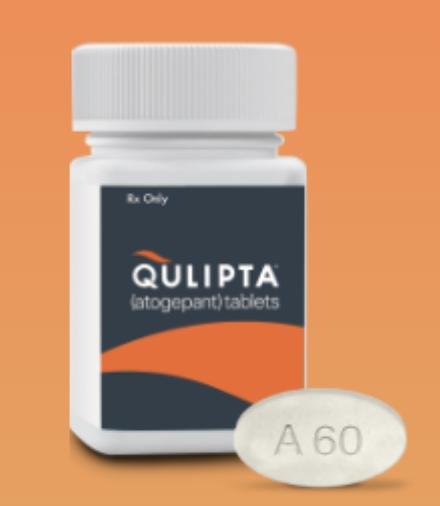Atogepant Dosage
Medically reviewed by Drugs.com. Last updated on Oct 10, 2024.
Applies to the following strengths: 60 mg; 10 mg; 30 mg
Usual Adult Dose for:
Additional dosage information:
Usual Adult Dose for Migraine Prophylaxis
Episodic migraine: 10 mg, 30 mg, or 60 mg orally once a day
Chronic migraine: 60 mg orally once a day
Use: For the preventative treatment of episodic and chronic migraine
Renal Dose Adjustments
- Mild to Moderate Renal Dysfunction : No adjustment recommended
- Severe Renal Dysfunction and ESRD (CrCl less than 30 mL/min):
- Episodic migraine: 10 mg orally once a day
- Chronic migraine: Avoid use
Liver Dose Adjustments
- Mild to moderate hepatic impairment : No adjustment recommended
- Severe hepatic impairment : Avoid use
Dose Adjustments
Elderly: Dose selection should be cautious, generally starting at the low end of the dosing range.
Concomitant CYP450 3A4 Inducers/Inhibitors:
- Strong CYP450 3A4 inhibitors:
- Episodic migraine: 10 mg orally once a day
- Chronic migraine: Avoid use
- Strong, moderate, or weak CYP450 3A4 inducers:
- Episodic migraine: 30 mg or 60 mg orally once a day
- Chronic migraine: Avoid use
- OATP inhibitors:
- Episodic migraine: 10 mg or 30 mg orally once a day
- Chronic migraine: 30 mg orally once a day
Precautions
CONTRAINDICATIONS:
- History of hypersensitivity to this drug or any of the components
Report Adverse Reactions at www.fda.gov/medwatch.
Safety and efficacy have not been established in patients younger than 18 years.
Consult WARNINGS section for additional precautions.
Dialysis
For patients undergoing intermittent dialysis: 10 mg orally once a day with dose to be administered after dialysis
Other Comments
Administration advice:
- Take orally once a day with or without food.
Storage:
- Store between 20C and 25C (68F and 77F), with excursions permitted between 15C and 30C (59F and 86F).
Patient advice:
- Read the Patient Information and Instructions for Use.
- Patients should understand that this drug may interact with other drugs and dose adjustments may be necessary; patients should be instructed to report use of all prescription medications, over-the-counter medications, herbal products, and/or grapefruit to their healthcare provider.
Frequently asked questions
- How do Ubrelvy, Qulipta and Nurtec compare for migraines?
- What are the new drugs for the treatment of migraine?
- Does Qulipta (atogepant) cause hair loss?
More about atogepant
- Check interactions
- Compare alternatives
- Reviews (188)
- Side effects
- During pregnancy
- Drug class: CGRP inhibitors
- Breastfeeding
- En español
Patient resources
Other brands
Professional resources
Other brands
Related treatment guides
Further information
Always consult your healthcare provider to ensure the information displayed on this page applies to your personal circumstances.


